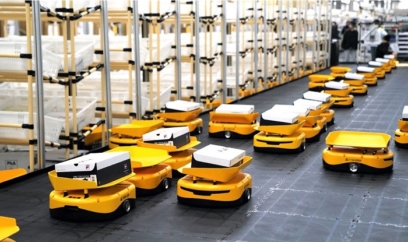-
ROSSLARE EUROPORT TARGETS HEALTH & SAFETY WITH CAMERA TELEMATICS PARTNERSHIP - 2 days ago
-
Landmark Study Reveals Wearable Robotics Significantly Boost Safety and Efficiency in Industrial Environments - July 24, 2024
-
Visku Tackle The Retail Seasonality Challenge One Pallet At A Time - July 22, 2024
-
KAMMAC AND BERGEN LOGISTICS STRENGTHEN FASHION & LIFESTYLE SERVICES IN THE UK - July 19, 2024
-
TENTBOX EXTENDS PARTNERSHIP WITH ARROWXL TO SUPPORT INCREASING DEMAND - July 17, 2024
-
The Perfume Shop improves customer journeys while driving profitability in partnership with Scurri - July 17, 2024
-
ZEROMISSION SECURES £2.3M ($3M) INVESTMENT TO ACCELERATE ELECTRIC FLEETS - July 16, 2024
-
BCMPA CELEBRATES SUCCESS OF 2024 CONFERENCE - July 15, 2024
-
Best of the Best: Jungheinrich Celebrates Triple International Award Win - July 12, 2024
-
GOPLASTICPALLETS.COM CALLS ON NEW CHANCELLOR RACHEL REEVES TO CONSIDER PLASTIC PACKAGING TAX REFORM - July 10, 2024
Ever more logistics companies are seeking ways of maintaining or improving operational efficiency and customer service levels with fewer people, says Xia Hulling, founder and CEO of robotic sortation system specialist LiBiao Robotics
Alongside the construction and hospitality industries, logistics is among the business sectors to have been hit hardest by Europe’s dwindling labour market and the resultant recruitment issues.
The global pandemic and the economic and social turbulence that came with it is at least partly responsible for the pan-European workforce crisis, but, while every country saw lockdown blow a hole in the size of its workforce, other factors, such as an ageing population (more workers are reaching retirement age than are entering the jobs market) and record low levels of unemployment, are also contributing to the unprecedented labour shortages that Europe’s logistics operators now face.
And it seems that human resources – or, rather, a lack of human resources – are likely to be a long term problem across the continent. In France for example, The Center for Global Development projects that a worker gap of 3.9 million will have opened by 2050, while economists forecast that Germany’s workforce will peak in 2023 and then shrink by up to five million people by the end of the decade.
Many European countries are reporting record numbers of unfilled vacancies. Belgium, the Netherlands and Austria have all broken their respective ‘SITS VAC’ records recently while the United Kingdom currently has in excess of one million unfilled positions for the first time ever.
Reduced staff numbers can put significant strain on the existing employees within the warehouse and make an already physically demanding job more difficult and, therefore, even less appealing to potential new recruits. So, in effect, the labour crisis is making it harder to fix the labour crisis!
HGV drivers, warehouse order pickers and forklift operators are all proving difficult to attract and retain which means warehouse operators have had to increase wages and other employee perks to attract skilled personnel in the quantity that they are needed. However, given that wages are already one of the most significant costs associated with running a warehouse, the handsome financial packages that are now required to tempt forklift operators or other warehouse staff are prompting more and more logistics companies to seek new ways of maintaining or improving their levels of operational efficiency and customer service with fewer people.
It is no surprise then that those logistics companies who feel that a lack of staff is holding them back now – or Is likely to limit their growth potential in the future – are choosing to automate aspects of their intralogistics process.
Parcel sorting is one of the warehouse activities that is being automated increasingly frequently. Sortation systems based on Autonomous Mobile Robot (AMR) technology greatly reduce demands on manual workers in the sorting process, improve efficiency and greatly improve accuracy rates. And, for operations with a short delivery cycle and a high volume, such as ecommerce fulfilment centres, sorting robot systems represent a particularly attractive proposition.
One of the early pioneers of AMR-based sortation technology was LiBiao Robotics. LiBiao’s ‘Mini Yellow’ range of mobile sorting robots was developed as an extremely cost-efficient and flexible alternative to fixed tilt-tray and cross-belt conveyor-based sortation systems that were traditionally used within many busy parcel and e-commerce operations.
‘Mini Yellow’ robots (which are supported by a network of authorised dealers throughout Europe) are quick and easy to install and require minimal maintenance. The modular system is scalable and offers complete flexibility as additional robots are introduced as and when they are needed.
A recent adopter of ‘Mini Yellow’ robot technology – Hellenic Post (ELTA), the state-owned provider of postal services in Greece. – has been able to reduce its labour costs significantly and, because LiBiao robots are highly energy efficient, minimize on-site power consumption since its AMR sorting system went live.
With the shrinking labour pool making it harder to find and retain the people needed to undertake tasks traditionally performed by low-skilled workers in warehouses across Europe, there is likely to be no let up in the number of companies opting to take a robotic approach to sortation.

































